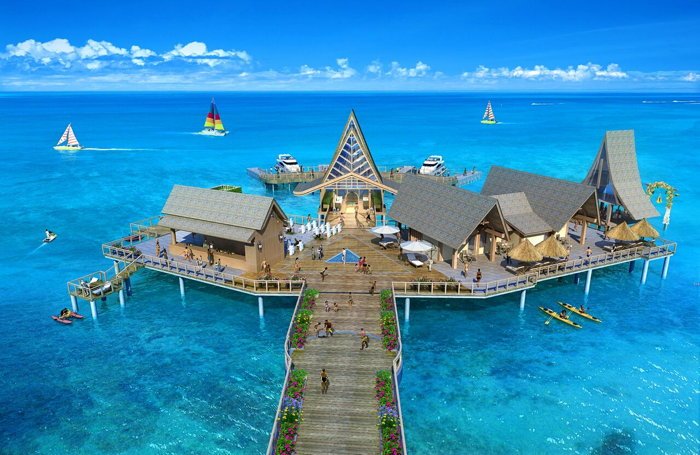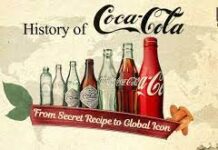Palau’s early history is still largely veiled in mystery. Why, how or when people arrived on our beautiful islands is unknown but studies indicate that today’s Palauans are distant relatives of the Malays of Indonesia, Melanesians of New Guinea, and Polynesians. As for the date of their arrival, carbon dating of artefacts for the oldest known village sites on the Rock Islands and the spectacular terraces of Babeldaob place civilization here as early as at least 3,500 BC.
The first recorded foreign contact took place in 1783 when the vessel Antelope, under the command of English Captain Henry Wilson, was ship wrecked on a reef near Ulong, a Rock Island located between Koror and Peleliu. With the assistance of Koror’s High Chief Ibedul, Wilson and his men stayed for three months to rebuild his ship. From that time onward, many foreign explorers called on Palau, and the islands were exposed to further European contact.
Foreign governance of our islands officially began when Pope Leo XIII asserted Spain’s rights over the Caroline Islands in 1885. Two churches were established and maintained by two Capuchin priests and two brothers, resulting in an introduction of the Roman alphabet and the elimination of inter-village wars. In 1899, Spain sold the Carolines to Germany, which established an organized program to trade the islands’ natural resources.
Following Germany’s defeat in WWI, the islands were formally passed to the Japanese under the 1919 Treaty of Versailles. The Japanese influence on the Palauan culture was immense as it shifted the economy and property ownership from the clan to individuals. In 1922, Koror became the administrative center for all Japanese possessions in the South Pacific. The town of Koror was a stylish metropolis with factories, shops, public baths, restaurants and pharmacies.
After Japan was defeated in WWII, the Carolines, Marianas and Marshall Islands became United Nations Trust Territories under the United States Administration, with Palau being named one of the six island districts. As part of its mandate, the US was to improve Palau’s infrastructure and educational system in order for it to become a self-sufficient nation. This came about on October 1st, 1994, when Palau gained its independence upon signing of the Compact of Free Association with the United States.
PALAUAN CULTURE
Palauan villages were, and still are, traditionally organized around matrilineal clans. Men and women had strictly defined roles. A council of chiefs governed the villages, while a parallel council of women held an advisory role in the control of land, money, and the selection of chiefs.
While women were caretakers of their homes and families, they also carried the responsibility of educating their children about Palauan traditions and culture, ensuring the continuity of the village.They also cultivated fields for taro and or tapioca and harvested shellfish from the shallow reefs. The sea was the domain of men who braved its fury to harvest the fish necessary to sustain the village and wage battle. Inter-village wars were common so men spent their time in the men’s meeting halls, or Bai, mastering techniques of canoe building and refining their weaponry skills.
Now with modern influences the people of Palau are giving much effort to the preservation of their culture, especially to younger generations. Cultural activities are held regularly, such as the annual Olechotel Belau Fair and twice-monthly Night Markets, which involve Palau’s sixteen states representing their unique qualities through dance, chanting, arts and crafts, specialty dishes, and much more. The Palau Women’s Conference is another important annual event led by Bilung and Ebilreklai, the high ranking traditional matriarchs of Koror and Melekeok, together with the women throughout Palau, The conference is held to discuss issues concerning the improvements and initiatives needed to strengthen Palau’s culture.
The early Palauans had few contacts prior to the arrival of the Europeans, although there was limited contact with the people that live in the Caroline Islands (today part of the Federated States of Micronesia) and some evidence suggests they may have had relations with people from islands that today make up Indonesia. The first Europeans didn’t step foot on the shores until the 1700s and in 1783 Henry Wilson was shipwrecked off the island of Ulong, at which time he met Palau’s king and relations between the Palauans and Europeans began. It was the late 1800s when the Europeans arrived in force with the Spanish designating the islands as a part of the greater Spanish power in the region, stretching from the Philippines in the west to the Marshall Islands in the east.
Palau was never settled by the Spanish and colonization was never really an objective and when in 1898 Spain lost the Spanish-American War, Palau was sold to Germany. The Germans discovered phosphate and bauxite as well as the value in growing coconuts. The next real change came in 1914 when the Japanese declared war against the Germans and took control of Palau. The Japanese continued to alter or destroy the local culture as they continued the mining operations and encouraged immigration to work these mines. The Japanese and other people under their control immigrated to the islands in huge numbers, soon outnumbering the local Palauan population. They also turned the small town of Koror into a thriving economic hub trading the mined goods, while also setting up new industries.
During and after WWII Palau’s economy and industry was heavily damaged: the mines destroyed much of the land and little land was left for farming or other forms of production. This resulted in the ethnic Japanese returning to Japan and the ethnic Palauans returned to farming and fishing. At the end of WWII the Americans took control over Palau and in1979 Palau was given the opportunity to join the Federated States of Micronesia, but turned down the offer since the countries have very different cultures and languages. Palau, for the time, remained under the protection of the United States.
From 1979 to 1994 the Palauan people argued the future of their country and in 1994 the people of Palau finally voted to declare independence from the United States, although they remain in a free association with the U.S which continues to handle most of Palau’s defense and some of their foreign affairs.
Palauan National Anthem (Belau Rekid)
Palau doesn’t hold a large number of celebrations and events throughout the year. However, there are some that will interest travelers, especially if they are coming from the US. Several major American holidays are recognized and celebrated here, with Thanksgiving the most popular event among locals and expatriates alike. Of course, Palau’s Independence Day is fondly celebrated by citizens each year and is often regarded as the most important day on the Palau holiday calendar.
International Photo Festival
Held during March, the International Photo Festival has featured on the Palau calendar since 2002. This underwater photography festival lures many world-renowned nature photographers to the archipelago each year. Most dive shops around Palau are invited to the event, so tourists need only make reservations with local dive operators to enjoy this festival.
Earth Day
Earth Day, which falls on April 22 each year, is a magnificent celebration of Mother Nature. It is celebrated around the world, but with Palau’s heavy reliance on a healthy Mother Nature, the island hold this day in high regard. There are always plenty of awareness campaigns and Koror becomes an even greater buzz than it usually is.
Constitution Day
This day is celebrated across Palau. Although most of the festivities are found in the city of Koror and the capital district known as Ngerulmud, the entire country experiences a holiday on this day. Constitution Day, which falls on July 9 each year, commemorates the signing of the Nuclear-free Constitution in 1981.
Independence Day
After many years of civil unrest, Palau finally experienced peace after becoming independent on October 1, 1994. Independence Day is celebrated throughout the country on this day every year. It is both a working and school holiday. Most of the activities and performances on this day are found in the largest city of Palau, Koror.
Thanksgiving
Palau boasts a very American culture, and therefore many North American holidays are celebrated on the islands. However, one of the most famous holidays held during the year is Thanksgiving. This food-filled event, celebrated on the last Thursday in November, is well catered for across the country. However, most of the local restaurants and dining options that serve Thanksgiving meals are found on the islands around Koror.
Palau Challenge – Belau Triathlon
The island of Koror is home to the Palau Challenge, which is organized by the Belau Triathlon Federation. It is an exciting and popular event that has been held for about five years. It includes several disciplines and races, including open ocean swimming, a triathlon, and cycling events. The program is open to anyone fit enough to enjoy the beauty of Palau via a long and arduous triathlon. It occurs on December 1 and December 2 annually.
Christmas
Like all other Christian nations around the globe, Christmas is celebrated in Palau on December 25. Tourists will be able to enjoy a wide range of festivities leading up to this magnificent day, especially around the many churches in Palau. Following Christmas comes New Year’s Eve, which is a fun yet expensive time on the islands.
Palau Festivals Palau Holidays Palau National Anthem Palau History Palau Festivals Palau Holidays Palau National Anthem Palau History Palau Festivals Palau Holidays Palau National Anthem Palau History Palau Festivals Palau Holidays Palau National Anthem Palau History Palau Festivals Palau Holidays Palau National Anthem Palau History Palau Festivals Palau Holidays Palau National Anthem Palau History








[…] beauty of jazz music is on display for tourists and locals at the San Marino Jazz Festival. Held over three days in July, this majestic festival […]